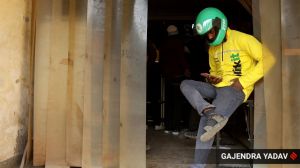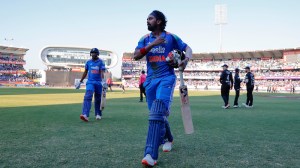Goodbye, Kalpana
For us, the spectacular loss of Columbia became the moment to mourn Kalpana Chawla and to celebrate her amazing journey from Karnal to the s...

For us, the spectacular loss of Columbia became the moment to mourn Kalpana Chawla and to celebrate her amazing journey from Karnal to the stars. In the US media, it resurrected the debate on America8217;s space programme.
The sad thing, columnist Paul Krugman wrote in the NEW YORK TIMES, is that for years NASA has struggled to invent reasons to put people in space. He argued that almost all the payoff from space travel has come from unmanned vehicles and satellites. In space, he said, people are a nuisance 8212; 8216;8216;They8217;re heavy; they need to breathe; trickiest of all, as we have so tragically learned, they need to get back to earth8217;8217;. In TIME, Gregg Easterbrook, senior editor of THE NEW REPUBLIC, argued that the American space programme is wedded to a space shuttle programme that is too expensive, too risky, too big. But tough questions go unasked, he said, because of vested interests. Switching to unmanned rockets for payload launching and a small space plane for those rare times humans are needed would cut costs, he said, which is why aerospace contractors have lobbied against such reform.
But for WASHINGTON POST columnist Charles Krauthammer, the problem lay not with the enterprise8217;s overreach but in its lack of ambition. The fantastic risk can be justified, he wrote, but only for fantastic journeys. The aim of such shuttle flights mustn8217;t be to produce a laboratory for the biology of weightlessness, but to go beyond 8212; to the moon, asteroids, Mars 8212; 8216;8216;to set foot in new worlds, learn their mysteries, establish our presence8217;8217;. Icarus fell because he flew too close to the sun. Columbia and the whole American manned space programme fell, said Krauthammer, because it flies too close to the Earth.
On Chawla, the GUARDIAN8217;s headline put it the best: 8216;8216;Indian engineer who died at the moment she had lived for8217;8217;.
Powell conquers8230;
They said Colin Powell8217;s performance at the Security Council didn8217;t bring the convincing 8216;Adlai Stevenson moment8217; the US media lay in wait for. That iconic moment in Cold war history, when the UN envoy displayed poster-sized aerial reconnaissance photographs putting the lie to Khrushchev8217;s claim that the Soviet Union had not deployed offensive weapons in Cuba.
But the US media agreed to agree that Powell had made the most compelling case. In its editorial, even the so-far sceptical NEW YORK TIMES laid down arms: Powell8217;s presentation 8216;8216;may not have produced a 8216;smoking gun8217;, but it left little question that Mr Hussein had tried hard to conceal one.8217;8217;
Most commentators wrote the same column. Yes, there wasn8217;t an airtight case that the Saddam regime is plotting with Al Qaeda or that US faces an imminent threat from Iraq. But, the evidence was 8216;8216;irrefutable8217;8217; and Powell8217;s case 8216;8216;overwhelming8217;8217;. Many argued that the messenger was the message. What mattered was that the case for war was made by the administration8217;s leading dove. What counted was that Powell is the man 63 per cent Americans trust most with policy on Iraq.
8230;.But Not the UK
Powel couldn8217;t escape unscathed in the British media though. In the INDEPENDENT, Robert Fisk wrote that it was like something out of Beckett: 8216;8216;Sources, foreign intelligence sources, 8216;8216;our sources8217;8217;, defectors, sources, sources, sources. Colin Powell8217;s terror talk to the UN Security Council sounded like one of those government-inspired reports8230;8217;8217; Also from Britain, reports of Downing Street being plunged into 8216;8216;acute international embarrassment8217;8217; after it emerged that large parts of the British government8217;s latest dossier on Iraq 8212; based on 8216;8216;intelligence material8217;8217; and singled out in Powell8217;s speech 8212; were taken from published academic articles, some of them several years old.
Picture This
Several papers in the Middle East carried Norman Soloman8217;s account of 8216;Waiting for the missiles in Baghdad8217;. 8216;8216;Picture yourself as an American reporter here in the Iraqi capital8230; 8216;minders8217; accompany you8230; editors back home want you to be a bit ahead of the US media curve 8212; but not too far out on a limb. Your stories are supposed to be ahead of the pack but not out of step8230; You might do a story about the escalating fears among Iraqi children. Many of them are now exhibiting signs of acute anxiety8230; But the routine baseline of journalism cannot be shirked. There are officials to quote, political statements to analyse, military scenarios to assess8230;8217;8217;
War and Verse
Auden wrote that 8216;8216;poetry makes nothing happen8217;8217;. Except when violent events are upon us 8212; the NEW YORK TIMES tagged on that qualification this week. The 8216;8216;slumbering legions8217;8217; of American poets were set marching, it seems, when Laura Bush postponed a White House symposium after some poets invited to the event announced they would use it to protest war against Iraq. Poets the NYT spoke to expressed hope that the beauty and precision of their language will make a difference. They pledged to tell the truth, to rescue its ambiguity and paradox at a time when people want black and white answers. But, the NYT, wondered: would any of them have the 8216;grand witty8217; imagination of Greek playwright and poet Aristophanes? Who, in his play Lysistrata, came up with the thought that women should withhold sex until their men gave up their warring ways. 8216;8216;Women are so wonderful: they did it. And it worked.8217;8217;
- 01
- 02
- 03
- 04
- 05































